"Wear a hard hat out there today, Tine."
Tine ventured out on her walk alone today. She had to overcome a certain reluctance to go, because Rubob was occupied in the world at large and because the forecast for Tuesday had been somewhat foreboding yesterday: One hundred percent chance of ice pellets. Whiny had no interest in joining Tine on her walk; she was busy eating a jelly donut and watching shows she shouldn't watch on television.
Tine looked out the window, and saw only snowflakes falling, not ice pellets. In fact, the forecast appeared to have been revised.

But Rubob, who’d been out shoveling snow earlier, had cautioned Tine: “You have to wear a hard hat out there. I got bonked on the head of couple of times. They’re like grenades.”
“What are like grenades, Rubob – the ice pellets? Are there really ice pellets?" Tine asked.
“No, there aren’t any ice pellets, but the trees are dropping snow bombs, Tine.”
Why would they do that, Tine wondered? "They must be like the trees in 'The Wizard of Oz.' "
Rubob had cleared a nice path down the driveway before he set off in the vehicle this morning, and Tine hastened down to the street, hoping the street might give her an idea on which direction to take today. The street was quiet, though (for the time being), and heaped with snow, ice, slush, sludge, mush – every variation on frozen water but ice pellets, it seemed.

At that moment, a snow bomb landed at Tine's feet, with a nice firm smack (like the sort of smack Whiny might get when she was naughty, if she didn't have such lenient parents). "The street isn't entirely silent," Tine thought. "And Rubob was right: I should have worn a hard hat."

Tine moved farther out into the road to avoid the trees' snow bombs, and she turned up Diamond Glen, because -- well, because that's where she'd walked recently with Rubob, and she thought he might be present in spirit if she followed their steps again.
“Walks aren’t the same without Rubob,” she thought. "But they’re nice all the same." She often finds things when she walks alone that she wouldn’t find otherwise. One thing she certainly found was that she missed Rubob, but she found other things, too, such as: What a difference a day makes.
If you've been following Rubob and Tine's walks, you'll remember the slate steps on the Guermantes Way. How transformed they appeared under a fresh coat of snow, ice, slush, sludge and mush, and maybe a few tree bombs besides.
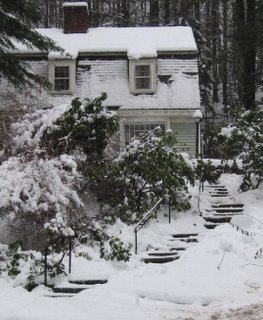
As she contemplated this scene, Tine hummed "What a Difference a Day Made" and wondered whether she might have to pay royalties to the composers of the song. "I'll leave that up to Rubob," she thought. "He's quite good with legal matters."
"What a difference a day made
Twenty-four little hours
Brought the sun and the flowers
Where there used to be rain
My yesterday was blue, dear
Today I’m part of you, dear
My lonely nights are through, dear
Since you said you were mine
What a difference a day makes."
Of course, there was no sun and flowers today, but Tine doesn't require sun and flowers to be quite content. Even snow, ice, slush, sludge and mush will suffice -- and maybe even a snow bomb besides.
And at that very point, another snow bomb was hurled by a tree limb, and it just missed Tine's head. It landed on the road with a decisive plop. To Tine, everything on walks deserves close examination, but these snow bombs were particularly fascinating. "They look like stars," Tine thought. "I wonder whether the trees collected some stars last night to hurl at Rubob and me."
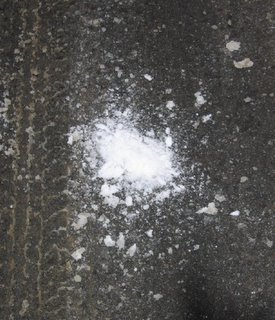
Tine shouldn't have lingered so long over that particular snow bomb. If you look carefully at the photo you can see why. That's the track of a vehicle in the mush, without a doubt, and Tine had wandered too far out into the road. A very large vehicle was presently determined to clear the spot that Tine was standing on. She leapt to the side of the road just in time. The snowplow was moving so quickly that a snapshot was difficult, even with the shutter setting on fast. An attempt was made to to capture the plow, and this shot will reveal whether it was successful:
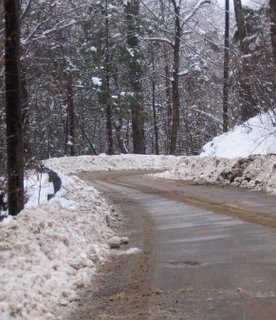
Some film might have been wasted on that shot, Tine thought, if Tine hadn't been taking her walk in the digital age. "It's still a bit messy for the digital age, though," she reflected, wiping some snow and slush off her coat. "But that's how it should be," she thought. Further examination of the photo revealed one of Tine's snow bombs at the edge of the road, so perhaps the photo wasn't wasted after all.
After Tine had retrieved herself from a snowbank, she heard what Rubob described the other day as a "gurgling." Rubob's gurgling had come from a stream at the bottom of Norton Lane, just as he'd expected, and Tine's gurgling came from the stream rushing down from the millpond on Diamond Glen, just as she'd expected. "It certainly is louder today," Tine thought. "It must be the melting snow, ice, slush, sludge and mush." (Whiny's gurgling, incidentally, tends to come not from streams but from Whiny.)
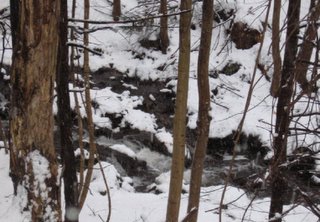
This walk is turning out to be about sounds," Tiny thought. "First we had the road, which was keeping quiet about which direction to go, then we had the smacks and plops of the snow bombs, and now we have the gurgling brook. R ubob would enjoy this." And she waited for Rubob to expand (and expound) on the theme, but Rubob was understandably silent, because he was occupied with the affairs of the larger world today.
Tine made her way along Reservoir Road, where she found something Rubob would like, because Rubob is fond of trees:

This would inspire Rubob to hold forth on "the natural sculpture of trees," Tine thought, and how it compares to the "clunkiness" of houses. "Well, here's a clunky barn for further comparisons," she thought. "It's like our walk on the Guermantes Way last week, only with snow, ice, slush, mush and slush." And not to be overlooked, another frosty element in that series landed with a thud behind her:

"That's the best one yet," Tine thought. "It's not just a star hurled by a tree limb but an entire galaxy."
"Hurry up, Tine," Rubob said -- or said in Tine's head. Rubob was, in fact, not only a shadow member of the Hysterical Society, as he told the guests at the annual gathering the other afternoon, but a shadow participant in Tine's walk today, with nearly all the rights and privileges. "And you shouldn't be standing in the middle of the road."
"OK, Rubob. I just thought that one was the best of all. I should have worn a hard hat, just like you said." (The truth is that Tine heard Rubob say, "You should have worn a helmet," but Rubob corrected her on this later: "I said hard hat." In hindsight, a helmet would have sufficed, too).
Tine walked briskly down the hill on Mountain Road, urged on in her mind by Rubob. She was eager to get off the busy thoroughfare, onto the sidewalk. But where the sidewalk should have been there was only snow, ice, slush -- well, you get the idea. "They haven't done their civic duty, Rubob," Tine thought, because that's what Rubob would say. "They're scofflaws, Rubob. Scofflaws!" (She added Rubob's emphasis to the word.) Tine trudged through what amounted to the series of variations on frozen and partly frozen water. "Rubob would expand on that theme by steaming," Tine thought. "And Rubob is a steam engine. He'd steam right through this." Tine imagined that her little boots were steaming, so busy were they clamoring over this thoughtless impediment to foot traffic in the village.
Regaining the plowed sidewalk -- the beaten path, as it were (though Tine was feeling more beaten by the unplowed path) -- Tine happened upon a house that might easily have been hers it was so small and inviting.

But in Tine's village, like in so many other villages these days, tiny houses fetch small fortunes, because of something Rubob is fond of calling "the Bubble." So it wouldn't be Tine's very easily at all, unless Tine found gainful employment in the world at large. "I could commute in the vehicle with Rubob," Tine thought. "I could do sums or bake pies."
It would probably strike Rubob as a silly idea, Tine thought, but almost the next house she came to was the former home of a woman who did quite nicely for herself baking pies. Tine took an interest in the Christmas lights on a tree outside the house where a caterer and restaurateur lived until recently.

"Yes, I could bake pies," Tine thought. "I wonder whether I might stop in at the caterer's house for a pie -- but no, she's moved. The new owner might not have any pies." If Whiny had been along on the walk, she might have insisted that Tine ring the bell and inquire about a pie, but Whiny was at home filling her mind with television ad jingles and her mouth with Gob Smackers or some such sticky things.
And speaking of Whiny, Tine came to her school at that moment and saw something rather curious:

What were those things hanging on the tree outside the school door, Tine wondered? "Those aren't the heads of disobedient children, are they?" (Tine entertained herself with preposterous thoughts at times, especially when Rubob wasn't along to entertain her. And then, too, it must be allowed that her mind was confronted with the image of school doors, which aren't always the most inviting of doors, especially on snow days or holidays.) "No, that couldn't be, because Whiny's head would be sure to be among them," she thought, "and Whiny is planted happily in front of the TV at home with a packet of Starburst Chews, a frosted donut or something or other." Tine had a warm feeling thinking about her disobedient, willful child, Whiny.
The next sight on Tine's walk was just as curious to her: a tree that was evidently taking shelter from the snow, or perhaps from ice pellets:

"It isn't that bad," Tine felt inclined to say to the tree. "You should come out and hurl snow bombs with the rest of the trees. It's probably fun." But the tree was having nothing of it. "I'll just stay right here under this eave for the time being, thank you very much," it seemed to say to Tine.
"This isn't the sort of tree that Charles II could hide in, is it, Rubob?" Tine said to her absent companion. "In fact, I think this tree might try to hide in Charles II's palace. And he owed a certain debt to trees, after all. He did have a palace, didn't he, when he wasn't hiding in trees?" But Rubob was silent on this historical matter.
Tine turned the corner and headed toward an old schoolhouse that was now someone's home. The schoolhouse probably had "No Outlet," Tine thought, because it no longer had any schoolchildren in it.

It was like the playground on a snowy day, childless. The odd thing is, though, that Tine heard the sounds of children playing. They must have been over the crest of the hill with their sleds (either that or they were shadow children).

"I'd like to go play there," Tine thought, looking toward the playground, but Rubob said, "We have to be getting home, Tine." Rubob wouldn't want to go there, even as a shadow participant in this walk -- not after shoveling all morning -- so Tine pushed along.
And speaking of Rubob, one of the next houses that Tine passed is one of his favorite subjects, a perennial topic, a white canvas, as it were, on which he can spread all the colorful themes of his palette -- except that it isn't white, or at least not white enough for Rubob, and it isn't canvas; it's brick.
"The yellow particularly stands out when there's white snow around it, doesn't it, Tine?" That's what Rubob would have said today, Tine thought.
Perhaps he's right, she said to herself, but if it were the ideal shade of white, what would we have to talk about when we passed it? Rubob would say, 'That's the old tin shop, Tine -- a very pleasing shade of white, not a lamentable yellow,' and I would say, 'Yes indeed, that's the former tinsmith's house, blending in with the snow.' But we walk nearly every day and we'd get tired of saying that. At least the topic the house presents, its color, changes with each day. What a difference a day makes to a tin shop, Rubob."

Tine continued down the road and passed another old schoolhouse with no outlet, because it had been converted into a home. Perhaps children now lived there, though; maybe the house still had an outlet for all its energy, its schoolhouse energy.

Across from the old school was a house that had evidently chosen to share a life with its congenial neighbor, a conjoined house, Tine thought.
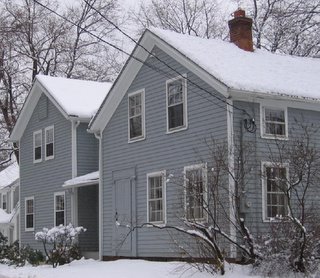
"They have each other for an outlet; they must enjoy each other's company, just like Rubob and me," Tine thought. She was reminded, too, of the two chimneys on one of the two hatter's cottages, which the two of them passed on their purposeful walk yesterday.
As Tine ambled home, she couldn't help noticing a sign that bore a distinct resemblance to Rubob when he was on a purposeful walk:

"You're looking nice and bright today, Rubob," Tine thought, "though that yellow stands out just a shade too much against the snow. And where's your hard hat?"
Perhaps Tine didn't venture out alone today after all. But regardless, she thought, all in all, it was a very pleasant walk.
Tine looked out the window, and saw only snowflakes falling, not ice pellets. In fact, the forecast appeared to have been revised.

But Rubob, who’d been out shoveling snow earlier, had cautioned Tine: “You have to wear a hard hat out there. I got bonked on the head of couple of times. They’re like grenades.”
“What are like grenades, Rubob – the ice pellets? Are there really ice pellets?" Tine asked.
“No, there aren’t any ice pellets, but the trees are dropping snow bombs, Tine.”
Why would they do that, Tine wondered? "They must be like the trees in 'The Wizard of Oz.' "
Rubob had cleared a nice path down the driveway before he set off in the vehicle this morning, and Tine hastened down to the street, hoping the street might give her an idea on which direction to take today. The street was quiet, though (for the time being), and heaped with snow, ice, slush, sludge, mush – every variation on frozen water but ice pellets, it seemed.

At that moment, a snow bomb landed at Tine's feet, with a nice firm smack (like the sort of smack Whiny might get when she was naughty, if she didn't have such lenient parents). "The street isn't entirely silent," Tine thought. "And Rubob was right: I should have worn a hard hat."

Tine moved farther out into the road to avoid the trees' snow bombs, and she turned up Diamond Glen, because -- well, because that's where she'd walked recently with Rubob, and she thought he might be present in spirit if she followed their steps again.
“Walks aren’t the same without Rubob,” she thought. "But they’re nice all the same." She often finds things when she walks alone that she wouldn’t find otherwise. One thing she certainly found was that she missed Rubob, but she found other things, too, such as: What a difference a day makes.
If you've been following Rubob and Tine's walks, you'll remember the slate steps on the Guermantes Way. How transformed they appeared under a fresh coat of snow, ice, slush, sludge and mush, and maybe a few tree bombs besides.

As she contemplated this scene, Tine hummed "What a Difference a Day Made" and wondered whether she might have to pay royalties to the composers of the song. "I'll leave that up to Rubob," she thought. "He's quite good with legal matters."
"What a difference a day made
Twenty-four little hours
Brought the sun and the flowers
Where there used to be rain
My yesterday was blue, dear
Today I’m part of you, dear
My lonely nights are through, dear
Since you said you were mine
What a difference a day makes."
Of course, there was no sun and flowers today, but Tine doesn't require sun and flowers to be quite content. Even snow, ice, slush, sludge and mush will suffice -- and maybe even a snow bomb besides.
And at that very point, another snow bomb was hurled by a tree limb, and it just missed Tine's head. It landed on the road with a decisive plop. To Tine, everything on walks deserves close examination, but these snow bombs were particularly fascinating. "They look like stars," Tine thought. "I wonder whether the trees collected some stars last night to hurl at Rubob and me."

Tine shouldn't have lingered so long over that particular snow bomb. If you look carefully at the photo you can see why. That's the track of a vehicle in the mush, without a doubt, and Tine had wandered too far out into the road. A very large vehicle was presently determined to clear the spot that Tine was standing on. She leapt to the side of the road just in time. The snowplow was moving so quickly that a snapshot was difficult, even with the shutter setting on fast. An attempt was made to to capture the plow, and this shot will reveal whether it was successful:

Some film might have been wasted on that shot, Tine thought, if Tine hadn't been taking her walk in the digital age. "It's still a bit messy for the digital age, though," she reflected, wiping some snow and slush off her coat. "But that's how it should be," she thought. Further examination of the photo revealed one of Tine's snow bombs at the edge of the road, so perhaps the photo wasn't wasted after all.
After Tine had retrieved herself from a snowbank, she heard what Rubob described the other day as a "gurgling." Rubob's gurgling had come from a stream at the bottom of Norton Lane, just as he'd expected, and Tine's gurgling came from the stream rushing down from the millpond on Diamond Glen, just as she'd expected. "It certainly is louder today," Tine thought. "It must be the melting snow, ice, slush, sludge and mush." (Whiny's gurgling, incidentally, tends to come not from streams but from Whiny.)

This walk is turning out to be about sounds," Tiny thought. "First we had the road, which was keeping quiet about which direction to go, then we had the smacks and plops of the snow bombs, and now we have the gurgling brook. R ubob would enjoy this." And she waited for Rubob to expand (and expound) on the theme, but Rubob was understandably silent, because he was occupied with the affairs of the larger world today.
Tine made her way along Reservoir Road, where she found something Rubob would like, because Rubob is fond of trees:

This would inspire Rubob to hold forth on "the natural sculpture of trees," Tine thought, and how it compares to the "clunkiness" of houses. "Well, here's a clunky barn for further comparisons," she thought. "It's like our walk on the Guermantes Way last week, only with snow, ice, slush, mush and slush." And not to be overlooked, another frosty element in that series landed with a thud behind her:

"That's the best one yet," Tine thought. "It's not just a star hurled by a tree limb but an entire galaxy."
"Hurry up, Tine," Rubob said -- or said in Tine's head. Rubob was, in fact, not only a shadow member of the Hysterical Society, as he told the guests at the annual gathering the other afternoon, but a shadow participant in Tine's walk today, with nearly all the rights and privileges. "And you shouldn't be standing in the middle of the road."
"OK, Rubob. I just thought that one was the best of all. I should have worn a hard hat, just like you said." (The truth is that Tine heard Rubob say, "You should have worn a helmet," but Rubob corrected her on this later: "I said hard hat." In hindsight, a helmet would have sufficed, too).
Tine walked briskly down the hill on Mountain Road, urged on in her mind by Rubob. She was eager to get off the busy thoroughfare, onto the sidewalk. But where the sidewalk should have been there was only snow, ice, slush -- well, you get the idea. "They haven't done their civic duty, Rubob," Tine thought, because that's what Rubob would say. "They're scofflaws, Rubob. Scofflaws!" (She added Rubob's emphasis to the word.) Tine trudged through what amounted to the series of variations on frozen and partly frozen water. "Rubob would expand on that theme by steaming," Tine thought. "And Rubob is a steam engine. He'd steam right through this." Tine imagined that her little boots were steaming, so busy were they clamoring over this thoughtless impediment to foot traffic in the village.
Regaining the plowed sidewalk -- the beaten path, as it were (though Tine was feeling more beaten by the unplowed path) -- Tine happened upon a house that might easily have been hers it was so small and inviting.

But in Tine's village, like in so many other villages these days, tiny houses fetch small fortunes, because of something Rubob is fond of calling "the Bubble." So it wouldn't be Tine's very easily at all, unless Tine found gainful employment in the world at large. "I could commute in the vehicle with Rubob," Tine thought. "I could do sums or bake pies."
It would probably strike Rubob as a silly idea, Tine thought, but almost the next house she came to was the former home of a woman who did quite nicely for herself baking pies. Tine took an interest in the Christmas lights on a tree outside the house where a caterer and restaurateur lived until recently.

"Yes, I could bake pies," Tine thought. "I wonder whether I might stop in at the caterer's house for a pie -- but no, she's moved. The new owner might not have any pies." If Whiny had been along on the walk, she might have insisted that Tine ring the bell and inquire about a pie, but Whiny was at home filling her mind with television ad jingles and her mouth with Gob Smackers or some such sticky things.
And speaking of Whiny, Tine came to her school at that moment and saw something rather curious:

What were those things hanging on the tree outside the school door, Tine wondered? "Those aren't the heads of disobedient children, are they?" (Tine entertained herself with preposterous thoughts at times, especially when Rubob wasn't along to entertain her. And then, too, it must be allowed that her mind was confronted with the image of school doors, which aren't always the most inviting of doors, especially on snow days or holidays.) "No, that couldn't be, because Whiny's head would be sure to be among them," she thought, "and Whiny is planted happily in front of the TV at home with a packet of Starburst Chews, a frosted donut or something or other." Tine had a warm feeling thinking about her disobedient, willful child, Whiny.
The next sight on Tine's walk was just as curious to her: a tree that was evidently taking shelter from the snow, or perhaps from ice pellets:

"It isn't that bad," Tine felt inclined to say to the tree. "You should come out and hurl snow bombs with the rest of the trees. It's probably fun." But the tree was having nothing of it. "I'll just stay right here under this eave for the time being, thank you very much," it seemed to say to Tine.
"This isn't the sort of tree that Charles II could hide in, is it, Rubob?" Tine said to her absent companion. "In fact, I think this tree might try to hide in Charles II's palace. And he owed a certain debt to trees, after all. He did have a palace, didn't he, when he wasn't hiding in trees?" But Rubob was silent on this historical matter.
Tine turned the corner and headed toward an old schoolhouse that was now someone's home. The schoolhouse probably had "No Outlet," Tine thought, because it no longer had any schoolchildren in it.

It was like the playground on a snowy day, childless. The odd thing is, though, that Tine heard the sounds of children playing. They must have been over the crest of the hill with their sleds (either that or they were shadow children).

"I'd like to go play there," Tine thought, looking toward the playground, but Rubob said, "We have to be getting home, Tine." Rubob wouldn't want to go there, even as a shadow participant in this walk -- not after shoveling all morning -- so Tine pushed along.
And speaking of Rubob, one of the next houses that Tine passed is one of his favorite subjects, a perennial topic, a white canvas, as it were, on which he can spread all the colorful themes of his palette -- except that it isn't white, or at least not white enough for Rubob, and it isn't canvas; it's brick.
"The yellow particularly stands out when there's white snow around it, doesn't it, Tine?" That's what Rubob would have said today, Tine thought.
Perhaps he's right, she said to herself, but if it were the ideal shade of white, what would we have to talk about when we passed it? Rubob would say, 'That's the old tin shop, Tine -- a very pleasing shade of white, not a lamentable yellow,' and I would say, 'Yes indeed, that's the former tinsmith's house, blending in with the snow.' But we walk nearly every day and we'd get tired of saying that. At least the topic the house presents, its color, changes with each day. What a difference a day makes to a tin shop, Rubob."

Tine continued down the road and passed another old schoolhouse with no outlet, because it had been converted into a home. Perhaps children now lived there, though; maybe the house still had an outlet for all its energy, its schoolhouse energy.

Across from the old school was a house that had evidently chosen to share a life with its congenial neighbor, a conjoined house, Tine thought.

"They have each other for an outlet; they must enjoy each other's company, just like Rubob and me," Tine thought. She was reminded, too, of the two chimneys on one of the two hatter's cottages, which the two of them passed on their purposeful walk yesterday.
As Tine ambled home, she couldn't help noticing a sign that bore a distinct resemblance to Rubob when he was on a purposeful walk:

"You're looking nice and bright today, Rubob," Tine thought, "though that yellow stands out just a shade too much against the snow. And where's your hard hat?"
Perhaps Tine didn't venture out alone today after all. But regardless, she thought, all in all, it was a very pleasant walk.
<< Home